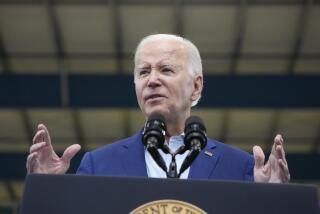Greenspan Turns More Optimistic
- Share via
WASHINGTON — Federal Reserve Chairman Alan Greenspan painted a somewhat brighter picture of the economy’s progress out of recession Thursday and said the fiscal stimulus package that Washington is about to debate might not be needed after all.
Greenspan accentuated the positive in an effort to offset the impression he left in a Jan. 11 San Francisco speech that the recovery faces “significant risks.” The speech sent stock prices tumbling and the bond market flying.
“There have been signs recently that some of the forces that have been restraining the economy over the past year are starting to diminish and that activity is beginning to firm,” he told the Senate Budget Committee on Thursday.
But the Fed chairman did not change his basic story about the economy’s condition, nor budge from his position that the recovery is likely to begin later and prove less robust than most investors and forecasters seem to think.
“The [financial] markets have been assuming a far more rapid snap-back than I frankly think is likely to happen, mostly because we haven’t gone down that far,” he said.
Stocks rose on Greenspan’s new assessment. The tech-heavy Nasdaq composite index jumped 20.2 points, or 1.1%, to close at 1,942.58. The bellwether Dow Jones industrial average climbed 65.11 points, or 0.7%, to 9,796.07. The broader Standard & Poor’s 500 index was up 3.97 points, or 0.4%, to 1,132.15.
Bond traders, who only two weeks ago seemed convinced the Fed would cut interest rates further, now are betting the central bank will leave its key rate unchanged when the bank’s policymaking Federal Open Market Committee meets Tuesday and Wednesday. The so-called fed funds rate, which banks charge one another for short-term loans, is at a four-decade low of 1.75%.
Both the White House and Senate Democrats renewed calls Thursday for a fiscal stimulus plan to spur recovery. But differences between the two sides’ proposals dim chances of anything passing. And as if that weren’t enough, Greenspan offered such a tepid endorsement he effectively suggested that he opposes the idea.
Greenspan declared himself conflicted over a stimulus package but concluded, “I do not think it is a critically important issue .... I think the economy will recover” whether or not a package is approved.
As he has before, Greenspan pointed to the unusual nature of the recession, saying it is concentrated in the nation’s business sector, rather than among consumers, as with most other downturns in the last five decades.
He said the economy should get its first shot in the arm when companies, which have let inventories of goods run down to cut costs, begin replenishing their stocks.
“With production running well below sales, the potential positive effect on income and spending of the inevitable cessation of inventory liquidation could be significant,” he said.
After that, he said, it depends critically on what consumers do. To date, they have continued spending at a surprisingly strong pace, prompted at least in part by low prices and the cash drawn from mortgage refinancing.
Greenspan said consumers’ continued enthusiasm could be dampened if employers continue to lay off large numbers of workers, but added there are signs “suggesting some abatement in the rate of job loss.”
The Fed chairman said the economy’s ultimate fate depends on a revival in profits and business capital investment. He did not say when he thought either would occur. Some cautious forecasters have suggested it could take most of this year and some of next before the business sector comes back strongly.
More to Read
Inside the business of entertainment
The Wide Shot brings you news, analysis and insights on everything from streaming wars to production — and what it all means for the future.
You may occasionally receive promotional content from the Los Angeles Times.









